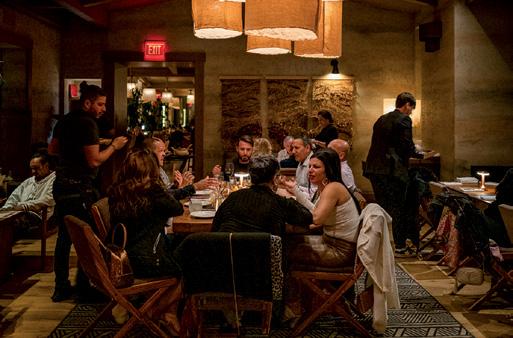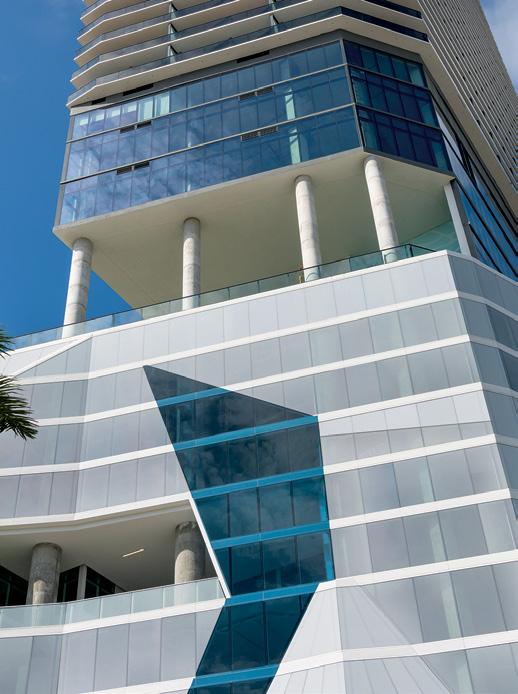
2 minute read
A Haven for Baseball
THE NATION’S SPORT OBSESSION FEEDS PLAYERS TO THE U.S.
BOCA CHICA, Dominican Republic -
Forget cigars, medical devices or even tourism services. For lovers of baseball, the most important export from the Dominican Republic is its baseball players.
This Caribbean nation sends more players to U.S. Major League Baseball teams than any other country besides the United States itself. About 500 Dominicans players now sign contracts with MLB organizations yearly, not just with MLB’s top 30 teams but also its minor leagues and other professional clubs, says the MLB Commissioner’s office in Dominican Republic, its only baseball operations office outside the U.S.
Drive past the turquoise waters and white sands of Boca Chica beach, down a windy inland road, and you’ll find outpost after outpost of MLB teams including the Miami Marlins. The Marlins last October opened the country’s newest MLB academy, built at a cost of $15 million, to develop Dominican players as well as players from nearby nations such as Venezuela, Colombia, and the Netherlands Antilles.
The 35-acre Marlins academy resembles a college campus. There are modern dorms that sleep about 100 players, plus classrooms with computers, a well-stocked cafeteria, and recreation rooms with ping-pong tables, TVs, and videogames. Players at the academy also have access to fully-equipped gyms, weight rooms, batting and pitching practice areas, three baseball fields and coaches that help with everything from how to bat to their nutrition. Mornings begin with classes in varied subjects, including English.
For teens at the academy, it’s typically their first time away from home. Many come from modest means and have never had access to so much quality food – tuna-fish cans stacked high, protein shakes and pista-
MAJOR LEAGUE BASEBALL COMMISSIONER’S OFFICE
PHOTOS: chios available anytime. They’ve also never had access to the abundant, quality gear they receive: shoes, uniforms and practice wear. Some are so endeared to staffers they call them “aunt” and “uncle.” Baseball for the talented youth represents both a passion and a possibility to make it big financially.
THE MIAMI MARLINS BASEBALL ACADEMY IS A 35-ACRE COLLEGELIKE CAMPUS THAT CAN HOUSE 100 PLAYERS. FACILITIES INCLUDE A FULLY EQUIPPED GYM, BATTING AND PITCHING PRACTICE AREAS AND RESIDENTIAL DORMITORIES WITH CAFETERIA.
This country is the only one outside the U.S. where all 30 MLB teams have academies, and “thanks to this, the Dominican Republic has become the mecca of baseball internationally,” says the local MLB Commissioner’s Office, which helps regulate and facilitate club operations in the country.


There’s big money at stake. The latest economic impact study, carried out in 2019, estimates the MLB and its teams spend $367 million a year in the country, including academy outlays and signing bonuses for players, among other expenses. They also contribute 1,200 direct jobs and thousands more indirect jobs to the Dominican economy, according to the MLB Commissioner’s Office.
Dominican baseball stars in the US often re-invest back home too. Hall of Famer Pedro Martinez, who grew up in one-room house with five siblings, helped re-develop his Santo Domingo neighborhood of Manoguayabo. The Boston Red Sox pitcher has constructed homes, schools, a window factory, and a baseball field. Hall of Famer Vladimir Guerrero built so much in his humble hometown of Don Gregorio de Nizao, NPR reports, that the former Los Angeles Dodger outfielder opened a concrete block factory, a trucking firm, and a hardware store. Of course, not all the players at academies make their way to professional baseball, even to the clubs that feed into MLB’s 30 elite teams. By some estimates, just 4 percent get into those ranks. And there’s concern that academies should do more to prepare trainees with skills for a life outside baseball. Pitcher Martinez himself now focuses much of his foundation’s work on educational needs in his homeland.
“The main step our country needs,” Martinez told a Washington, D.C. event this February led by Rep. Adriano Espaillat, (D-NY) the first Dominican-born federal lawmaker, “[is] to open doors throughout the world is education.” The theme for the Capitol Hill event was “Dominicans batting with bases loaded.”
Professional baseball players certainly seem to be educating themselves more on their rights. In December, the Major League Baseball Players Association, which also represents minor leaguers, opened its first international office. It’s located, of course, in the Dominican Republic. l












